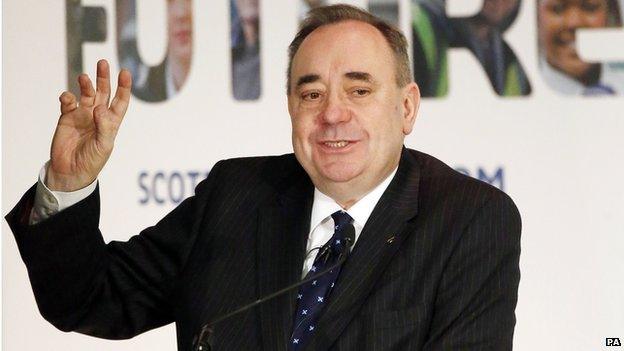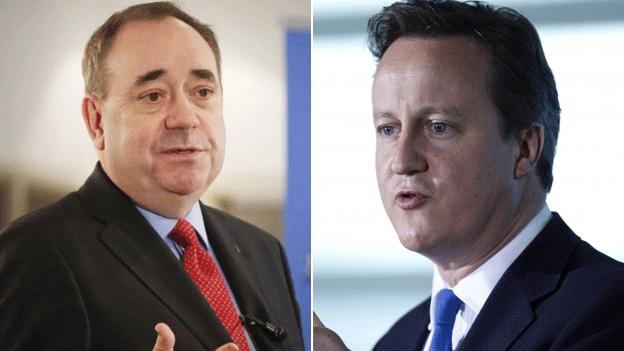Why does Salmond make referendum speeches in England?
- Published

Alex Salmond's speech will be his last in England before the independence referendum
Scotland's First Minster Alex Salmond, leader of the Scottish National Party (SNP), has made his final speech in England before the referendum. People living in England don't have a vote on independence. So what is he hoping to achieve?
Alex Salmond has told people in Liverpool that only a "Yes" vote in the referendum will protect Scotland's NHS from the "growing threat" of an agenda of "privatisation and fragmentation" at Westminster.
Scottish Labour's health spokesman Neil Findlay has accused the first minister of "scaremongering", saying "everyone knows [the NHS] is devolved to the Scottish Parliament".
Voters in Scotland go to the polls on 18 September - answering the "Yes/No" question: "Should Scotland be an independent country?"
But it is not the first time Mr Salmond has set out the case in England for a "Yes" vote.
On St George's Day, the politician told an audience in Carlisle an independent Scotland would be "a new growth pole to the north, shifting the economic gravity of these islands". Prime Minister David Cameron used the feast day of the English saint to say Scotland should remain united with England in the "world's greatest family of nations".
'Social union'
Mr Salmond made a similar point in his New Statesman in London lecture in March, when he said a post-Yes Scotland would help "rebalance the economic centre of gravity" across the UK. Scotland Office Minister David Mundell dismissed Mr Salmond's address, saying independence would make Scotland a foreign country.
The first minister has also used his speeches to say an enduring friendship would remain between England and Scotland in the event of a "Yes" vote.
Mr Cameron has also made speeches in Scotland in the lead-up to the referendum, urging voters to vote "No" and promising more powers for Scotland if it does.
But is it friendship the first minister is after? Or is there another strategy behind his decision to address those without a say in the Scottish referendum?
Scottish journalist and former SNP candidate George Kerevan says Alex Salmond has always believed in a "social union" between different parts of the UK and the speeches in England are part of that dialogue.
He explains: "Social union may sound contrived, but it's a union in the sense of a shared community, shared monarchy, a shared currency. You don't stop talking to the rest of the family even if you are living out of a parental home."
Kerevan also points out that while the referendum is something for those living in Scotland to vote on, if there is a "Yes" vote, the Scottish government will have to address the political and economic relationship with the rest of the UK.

Mr Salmond said the prime minister's visit to Scotland in May undermined the Better Together case
He said: "There's been a lot of theatre in the media - some apocalyptic. I think Alex Salmond is trying to explain what relationship Scotland wants, he's trying to create a partnership of equals.
"It's up to the Westminster government if they then consult England, Wales and Northern Ireland on that relationship, whether it wants to have a referendum over currency for example."
David Torrance, a journalist and author of Salmond: Against the Odds, believes Mr Salmond is trying to be the statesman.
He says it might seem paradoxical, but the first minister also sees himself as a UK player.
Torrance adds "He makes a play of being an Anglophile. He doesn't like a Scotland-only focus, which is ironic given the thrust of his ambition. But part of his narrative is that the English shouldn't worry and learn to love independence, that it shouldn't be seen as a threat - that it could kickstart decentralisation in England."
The idea that an independent Scotland would lead the way and show England how further local democracy could work is part of the standard nationalist argument, according to John Curtice, politics professor at Strathclyde University.
In Liverpool, Mr Salmond said an independent Scotland would be a "progressive beacon" for people elsewhere in the UK who are looking for an alternative to Westminster policies.


A referendum on whether Scotland should become independent is to take place
People resident in Scotland will be able to take part in the vote, answering the "yes/no" question: "Should Scotland be an independent country?"
The referendum will take place on Thursday, 18 September 2014
Go to the BBC's Scotland Decides page for analysis, background and explainers on the independence debate.

However, Prof Curtice thinks it is a slightly odd strategy. "Telling the English what the Scots are hoping to do, and why it's so much better, probably doesn't go down well with an English audience, but it could be part of a plan to sell the idea back home in Scotland."
The first minister is fond of making speeches about independence outside Scotland. He's made them in Brussels and Washington too, Curtice points out.
But he says he's not sure why Mr Salmond is still making speeches in England.
Curtice says: "I'd have thought his priority would be speaking to voters in Scotland - in Aberdeen on Monday, Dundee Tuesday, Stonehaven Wednesday etc - trying to convince people to vote the way he wants them to.
"The only good reason I can think of for him to speak in England is it's mid-July and the middle of the holiday season in Scotland - nobody is making major speeches in Scotland at the moment."
Former political journalist Kirsty Walker, now associate director of iNHouse Communications, says Mr Salmond's decision to speak in England could be seen as a "cynical PR stunt" designed to try to show that ties between England and Scotland will stay strong if Scotland votes "Yes" to independence.
She says: "As with his recent St George's Day speech in Carlisle, the location is mainly symbolic. His real audience will be those wavering voters and businesses in Scotland who have serious concerns about an independent Scotland's ability to hold its own in a global economy."
One thing a speech in England "almost certainly" guarantees, is that the national media will take more notice of it, she adds.
"Whether this will help him cut through to those crucial wavering voters in Scotland remains to be seen."
A Scottish government spokesman said the first minister was "delighted" to be speaking in Liverpool at the invitation of the Financial Times at the International Festival for Business.
He added: "As the first minister has frequently observed, an independent Scotland will see a rebalancing of political and economic power across these islands to the benefit of all nations and parts of the UK."